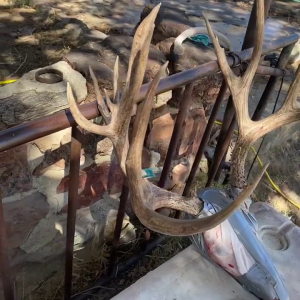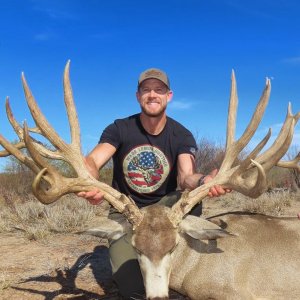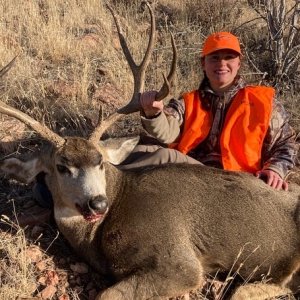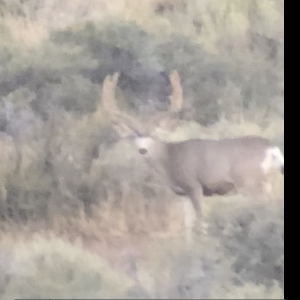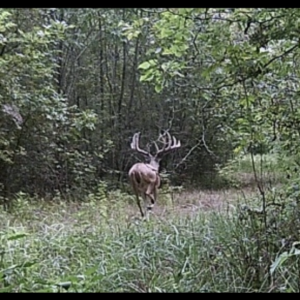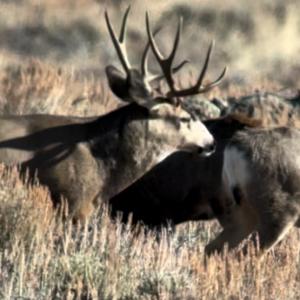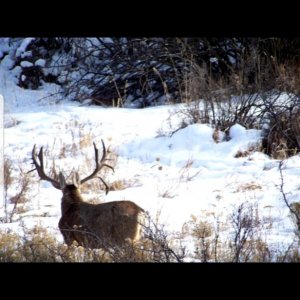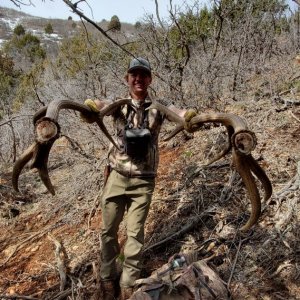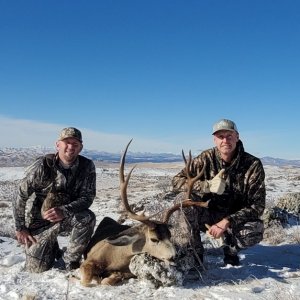T
TFinalshot
Guest
NIMROD'S TRACE 75
BY RON MOODY
? Copyright 2008
1/08
LOCKED GATES , THE KING?S DEER & CABELA?S, HUNTERS FACE CROSSROADS
Since George Custer made ?the last stand? a household expression at the Battle of the Little Bighorn, Montana has become famous as a place of gritty resistance to unwelcome powers.
Hunters and anglers in the Treasure State soon will take an irrevocable step on the path either toward a last stand for a democratic public hunting tradition or toward making our heirs into watchers of the king?s deer. That step to be taken in Montana likely will spell no-return to a democratic hunting heritage for any state in the USA - given that Montana is just about the strongest hold-out state against American hunting becoming an European clone.
I have long held hope that on-going discussions about landowners and sportsmen in local areas would, over time, produce a new ?good neighbors? deal that could resolve conflicts.
Cabela?s Inc has ended that hope for me. Their ?trophy hunting property? real estate marketing program means there is no longer any time for more congenial social interactions to work. Cabela?s is simply too powerful a marketing tool; they are sucking all the time out of the privatization of hunting debate. I now predict that the irrevocable step I describe above will be taken sometime in 2008.
How did we get where we are? History often drives the future, and I've long believed that hunters have weakened their power by failing to grasp the length and breath of privatization in our national past.
Conflict between two cultures of the hunt, one democratic the other oligarchic, have spanned the entire history of the USA. The momentum across history, to date, has been for democratic public hunting to weaken slowly against a strengthening dominant social value that ranks people according to their wealth.
Three hundred years ago, New England puritan colonists drove yeoman subsistence hunters off land owned by the hunter in order to give the property over to a farmer. In the 1840?s, wealthy Chicago sports sent out hired thugs to protect their ?hunting clubs? from trespass by locals who had previously roamed freely across the Illinois countryside.
In his 1856 classic book: ?Complete Manual For The Young Sportsman? Frank Forester wrote: ?On the waters of Chesapeake Bay . . . the shores for the most part belonging to comparatively few and wealthy proprietors, the points and islands being, as I have observed, ordinarily rented by clubs of sportsmen, and the excellence and actual value of the game being of sufficient importance to render its protection an object, the laws are rigidly enforced . . .?
The U.S. Supreme Court in 1842 decided that wild animals are public property; this has sustained a public sense of ownership of the game. But it has not resolved the struggle to enjoy the rewards of hunting either through opening or closing access to America?s hunting grounds.
Fast-Forward to 2008: though in retreat, a democratic public hunting tradition continues to exist. It is strongest in states blessed with large areas of public lands and waters; it is near death in states with little public land. This creates a temptation to bet all the chips for preservation of public hunting by ordinary people on public land management. This, however, does not work.
First, there simply are too many hunters to be accommodated with quality opportunities on existing public lands. Second, the concentration of public hunters on National Forests, BLM lands and state lands has the predictable effect of scaring game onto adjacent private land ? particularly private lands with little or no hunting pressure. Over-reliance on public lands by hunters and anglers thus feeds the privatization process instead of providing a public alternative.
To sustain itself, our American hunting and angling community needs 12-15 million people with a license in their pocket. Since public lands and waters can't carry that load, hunters and anglers have to face up to the challenge of making a square deal with the owners of private lands.
Before talking about what a new deal might look like it's important to note what the old deal that currently is being poisoned by money pollution once was.
Once upon a time, a hunter could call or knock on a door and simply receive permission to hunt on private property. This still happens today but it is the exception in the best of areas and a stark rarity in the rest of the country. Those landowners who still honor this ?good neighbor? relationship should be cherished as treasures by all sportspeople.
The getting of permission seems a straightforward process but there are some social, political and economic roots that need to be understood. First, the hunter?s reward is obvious ? an opportunity to hunt on private land. His direct cost, if any, is just as obvious: he has to show a basic respect and be responsible for the property he is allowed to use. Sometimes a small fee is charged ? if it doesn't stop a hunter of ordinary economic means from hunting this fee usually isn't considered a ?privatization.? The line on that remains fuzzy.
Less obvious are the network of indirect rewards that have accrued to ?good neighbor? landowners. In the past, these landowners have received a high social status from hunters for their contribution to both hunting and conservation. More directly, as America urbanized and the portion of the population that owns rural land dropped below two percent, city-dwelling hunters have maintained political support for the vast array of tax-dollar subsidies that keep most rural landowners in business. Along with the Federal farm program funded by billions of tax dollars there are federal and state income tax advantages, special low property tax rates, and indirect subsidies via below-cost grazing rates, etc.
Add in the sportsmen?s license dollars that go to ?landowner appreciation? programs (in Montana it's more than 11 cents of every license dollar) and we see that hunters and anglers are anteing up on their side of a ?good neighbor? relationship with private landowners. The one aspect in which this sometimes is not true is when hunters and anglers behave irresponsibly while on private property.
Much of the energy that drives privatization of hunting on private lands today is generated by the notion that landowners get to keep all the old rewards of being a good neighbor while raking in heaps of fresh new cash offered by wealthy sports who want exclusive access to quality opportunities.
If this remains the nature of the new deal between landowners and sportsmen then hunters have tacitly agreed to take that step I mentioned in the beginning toward creating a European clone. What our recent history proves is that two relationships don't co-exist. As cold cash advances neighborliness retreats.
The precise terms of a new ?square deal? will likely be complex; forcing the negotiation to take place will be a bitter and uncertain struggle. For hunters, however, the choice is unavoidable.
Like many of the most important choices made in a society this decision likely will be made by people who actually doing nothing. It's pretty obvious today what the ?do nothing? choice will mean for hunting and fishing in America in the 21st Century.
>
>
> Yr. Ob?t Sv?t Ron Moody
>
> Ron can be reached by email at [email protected]
> Nimrod's Trace is online at www.huntingandfishingjournal.org
BY RON MOODY
? Copyright 2008
1/08
LOCKED GATES , THE KING?S DEER & CABELA?S, HUNTERS FACE CROSSROADS
Since George Custer made ?the last stand? a household expression at the Battle of the Little Bighorn, Montana has become famous as a place of gritty resistance to unwelcome powers.
Hunters and anglers in the Treasure State soon will take an irrevocable step on the path either toward a last stand for a democratic public hunting tradition or toward making our heirs into watchers of the king?s deer. That step to be taken in Montana likely will spell no-return to a democratic hunting heritage for any state in the USA - given that Montana is just about the strongest hold-out state against American hunting becoming an European clone.
I have long held hope that on-going discussions about landowners and sportsmen in local areas would, over time, produce a new ?good neighbors? deal that could resolve conflicts.
Cabela?s Inc has ended that hope for me. Their ?trophy hunting property? real estate marketing program means there is no longer any time for more congenial social interactions to work. Cabela?s is simply too powerful a marketing tool; they are sucking all the time out of the privatization of hunting debate. I now predict that the irrevocable step I describe above will be taken sometime in 2008.
How did we get where we are? History often drives the future, and I've long believed that hunters have weakened their power by failing to grasp the length and breath of privatization in our national past.
Conflict between two cultures of the hunt, one democratic the other oligarchic, have spanned the entire history of the USA. The momentum across history, to date, has been for democratic public hunting to weaken slowly against a strengthening dominant social value that ranks people according to their wealth.
Three hundred years ago, New England puritan colonists drove yeoman subsistence hunters off land owned by the hunter in order to give the property over to a farmer. In the 1840?s, wealthy Chicago sports sent out hired thugs to protect their ?hunting clubs? from trespass by locals who had previously roamed freely across the Illinois countryside.
In his 1856 classic book: ?Complete Manual For The Young Sportsman? Frank Forester wrote: ?On the waters of Chesapeake Bay . . . the shores for the most part belonging to comparatively few and wealthy proprietors, the points and islands being, as I have observed, ordinarily rented by clubs of sportsmen, and the excellence and actual value of the game being of sufficient importance to render its protection an object, the laws are rigidly enforced . . .?
The U.S. Supreme Court in 1842 decided that wild animals are public property; this has sustained a public sense of ownership of the game. But it has not resolved the struggle to enjoy the rewards of hunting either through opening or closing access to America?s hunting grounds.
Fast-Forward to 2008: though in retreat, a democratic public hunting tradition continues to exist. It is strongest in states blessed with large areas of public lands and waters; it is near death in states with little public land. This creates a temptation to bet all the chips for preservation of public hunting by ordinary people on public land management. This, however, does not work.
First, there simply are too many hunters to be accommodated with quality opportunities on existing public lands. Second, the concentration of public hunters on National Forests, BLM lands and state lands has the predictable effect of scaring game onto adjacent private land ? particularly private lands with little or no hunting pressure. Over-reliance on public lands by hunters and anglers thus feeds the privatization process instead of providing a public alternative.
To sustain itself, our American hunting and angling community needs 12-15 million people with a license in their pocket. Since public lands and waters can't carry that load, hunters and anglers have to face up to the challenge of making a square deal with the owners of private lands.
Before talking about what a new deal might look like it's important to note what the old deal that currently is being poisoned by money pollution once was.
Once upon a time, a hunter could call or knock on a door and simply receive permission to hunt on private property. This still happens today but it is the exception in the best of areas and a stark rarity in the rest of the country. Those landowners who still honor this ?good neighbor? relationship should be cherished as treasures by all sportspeople.
The getting of permission seems a straightforward process but there are some social, political and economic roots that need to be understood. First, the hunter?s reward is obvious ? an opportunity to hunt on private land. His direct cost, if any, is just as obvious: he has to show a basic respect and be responsible for the property he is allowed to use. Sometimes a small fee is charged ? if it doesn't stop a hunter of ordinary economic means from hunting this fee usually isn't considered a ?privatization.? The line on that remains fuzzy.
Less obvious are the network of indirect rewards that have accrued to ?good neighbor? landowners. In the past, these landowners have received a high social status from hunters for their contribution to both hunting and conservation. More directly, as America urbanized and the portion of the population that owns rural land dropped below two percent, city-dwelling hunters have maintained political support for the vast array of tax-dollar subsidies that keep most rural landowners in business. Along with the Federal farm program funded by billions of tax dollars there are federal and state income tax advantages, special low property tax rates, and indirect subsidies via below-cost grazing rates, etc.
Add in the sportsmen?s license dollars that go to ?landowner appreciation? programs (in Montana it's more than 11 cents of every license dollar) and we see that hunters and anglers are anteing up on their side of a ?good neighbor? relationship with private landowners. The one aspect in which this sometimes is not true is when hunters and anglers behave irresponsibly while on private property.
Much of the energy that drives privatization of hunting on private lands today is generated by the notion that landowners get to keep all the old rewards of being a good neighbor while raking in heaps of fresh new cash offered by wealthy sports who want exclusive access to quality opportunities.
If this remains the nature of the new deal between landowners and sportsmen then hunters have tacitly agreed to take that step I mentioned in the beginning toward creating a European clone. What our recent history proves is that two relationships don't co-exist. As cold cash advances neighborliness retreats.
The precise terms of a new ?square deal? will likely be complex; forcing the negotiation to take place will be a bitter and uncertain struggle. For hunters, however, the choice is unavoidable.
Like many of the most important choices made in a society this decision likely will be made by people who actually doing nothing. It's pretty obvious today what the ?do nothing? choice will mean for hunting and fishing in America in the 21st Century.
>
>
> Yr. Ob?t Sv?t Ron Moody
>
> Ron can be reached by email at [email protected]
> Nimrod's Trace is online at www.huntingandfishingjournal.org

